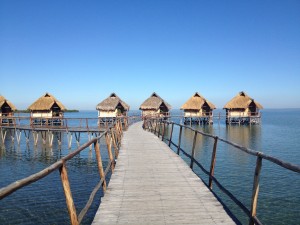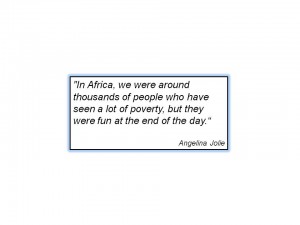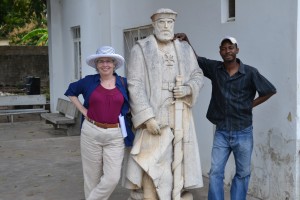Mozambique was all very lovely. The trouble with lovely is it doesn’t make a good story. Conflict makes for good reading.
So let me tell you about our angst.
Internal Conflict in Mozambique
The trouble with our lovely resort is, to get there we had to travel 40 kilometers from the airport in Inhambane through the country side of Mozambique and Mozambique is one of the poorest countries in the world.
We rode in the resort van over dusty roads through quintessentially African villages. We whizzed past children playing with bicycle rims, women and small children walking slow and erect with heavy buckets of water on their heads. The people were barefoot as they carried handmade hoes, bins full of coconuts or pineapples, or heavy bundles of sticks. I even saw one woman carrying a double bed mattress on her head. Sometimes these women are accompanied by men who carry nothing at all. Perhaps they are there to give encouragement.
Through the window of the van, Africa appears alluringly simple and carefree. Food is abundant and life is slow, as it would be if you had to walk half a mile everyday carrying your water on your head, but in truth it is hard, grinding poverty. I noticed there were very few old people. The children, most nearly naked or dressed in rags, had coughs and runny noses.
In Mozambique we were not expats but tourists. American tourists, white tourist, living in luxury, eating fresh caught seafood: tuna, barracuda, prawns and calamari, every night. This feast of fine food was taken by the native men from the sea outside our room and carried from the beach to the resort kitchen on the heads of shoeless, _capulana_ clad women.
The romance of this simple life was discredited on our first day when we venture out onto the beach. As soon as we stepped off the resort property, we were chased down by two boys selling trinkets. We had no money. We had left all our valuables safely locked in our rooms. We carried only hotel towels, and the necessities of our privileged life: sunglasses, I phones, sunscreen, room key. We had left our shoes and socks at the edge of the sand.
The boys were persistent, sharing their names and ours and extracting a promise that we would come back tomorrow to buy something. They were eager to have me pick out a 10 rand bracelet made of shells and string, promising to save it for me until I returned.
Further down the beach, a woman stopped and asked, in Portuguese, for our hotel towels. When we deferred saying the towels did not belong to us, she glanced pointedly at Steve’s camera, and left in disgust.
There were others, we stood out on the nearly empty beach like beacons. Everyone managed to overcome the language barrier sufficiently to communicate the message that we tourist with the camera and cell phones and towels, should share since we had so much and they had so little.
Needless to say we found the beach to be an uncomfortable place. I was beginning to think it was not a good idea to leave our shoes in the sand, though of course we had others, just not the _right_ shoes. So we hurried back to the safety of the resort.
Once inside the make shift barrier that divided us from the beach we were protected by a security guard with a Billy club. From the safety of our shaded beach chairs, with friendly and employed waiters to see to our every need, we had the leisure to think about our first world responsibility to the third world and how many African babies we will need to adopt to balance the scales.
Conflict Avoidance
After that first day we recognized our appropriate role – to spend money.
Spending money, in the appropriate currency is not as easy as it sounds. Each country has a different currency with a different exchange rate. Also, a different _cash_ fee required to obtain a visa to enter the country. In Mozambique the tourist visa cost $84 USD each! That took most of our cash until we could find a machine. However, cash machines are few and far between in Africa. And, unseasoned travelers that we are, it takes more than a few hours in a country to get local cash, internalize the new value and begin passing out appropriate amounts. It makes one appreciate the concept of a United States. And makes me sorry the Euro is not working as planned.
So, newly aware of what was expected of us, we worked with the front desk to purchased the services of a guide. The weather was cool, July being the equivalent of February, so the beach and its angst was not attractive anyway. Instead we ventured into town as part of the only two tourists on arranged tour.
“Discovered” by Vasco de Gama after he sailed around the Cape of Good Hope in 1498, the official language of Mozambique is Portuguese. For most residents, English is a third language and is spoken with a strange (to me) cadence and construction. Even the words take a bit of mental gymnastics to decipher: “Cof” for coffee, “Marry” for Wedding. The result was, difficult or complex questions were not possible to ask. And my confidence in my understanding of the answers to even simple question was weak. Much of what we saw remains mysterious.
Besides, we saw so much that was unfamiliar and strange that my talents as a writer will not suffice. Instead I offer you this seven minute multi-media travel log of our trip. It is my first effort, so I beg your patience with the glitches (and for the length: I had to try all the bells and whistles).
Amazing but True
We return to America, where everything is familiar and we know the value of a dollar, in just two weeks for a mandatory, for tax reasons, “home visit”. We will be there until just after Labor Day.
See you then.




